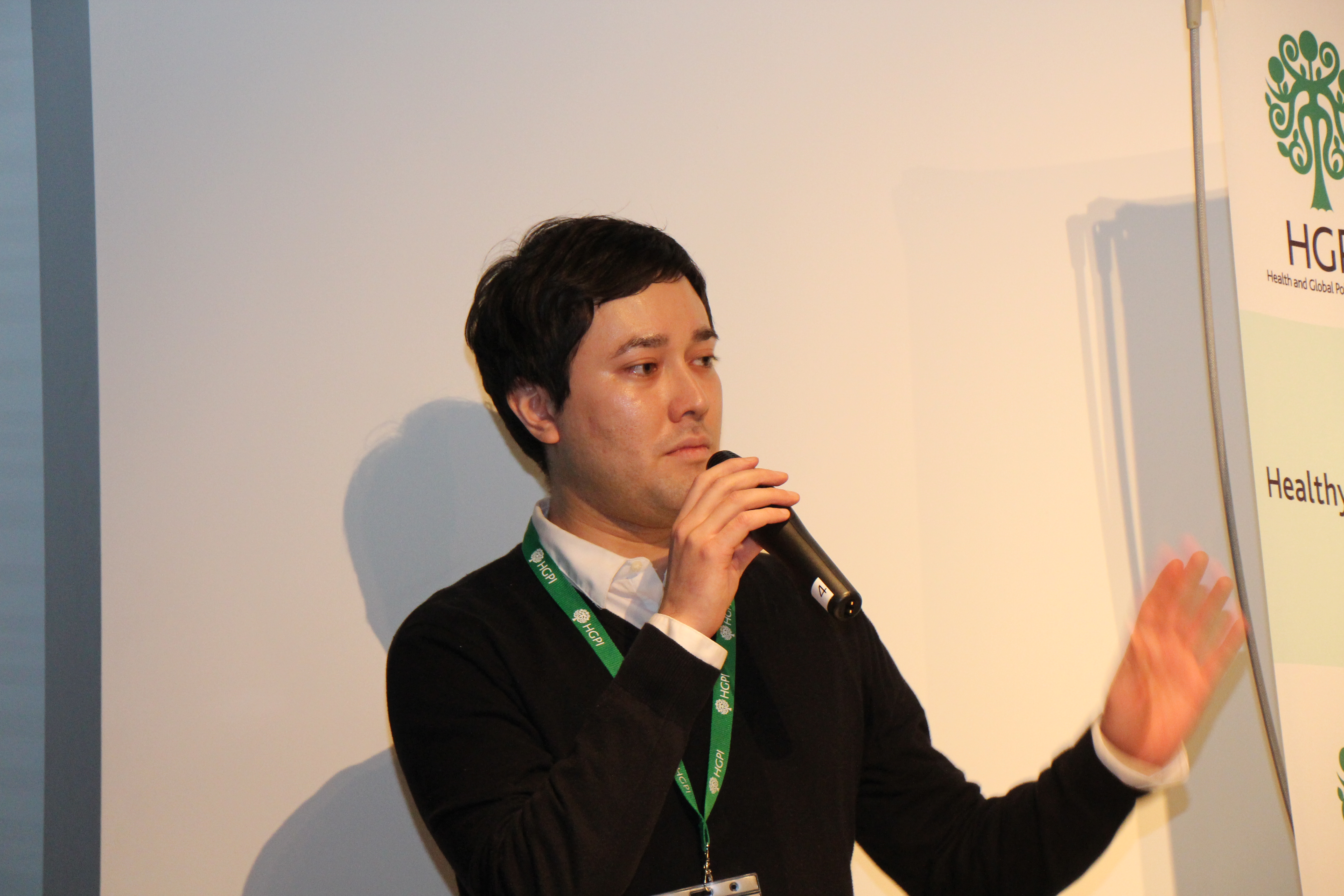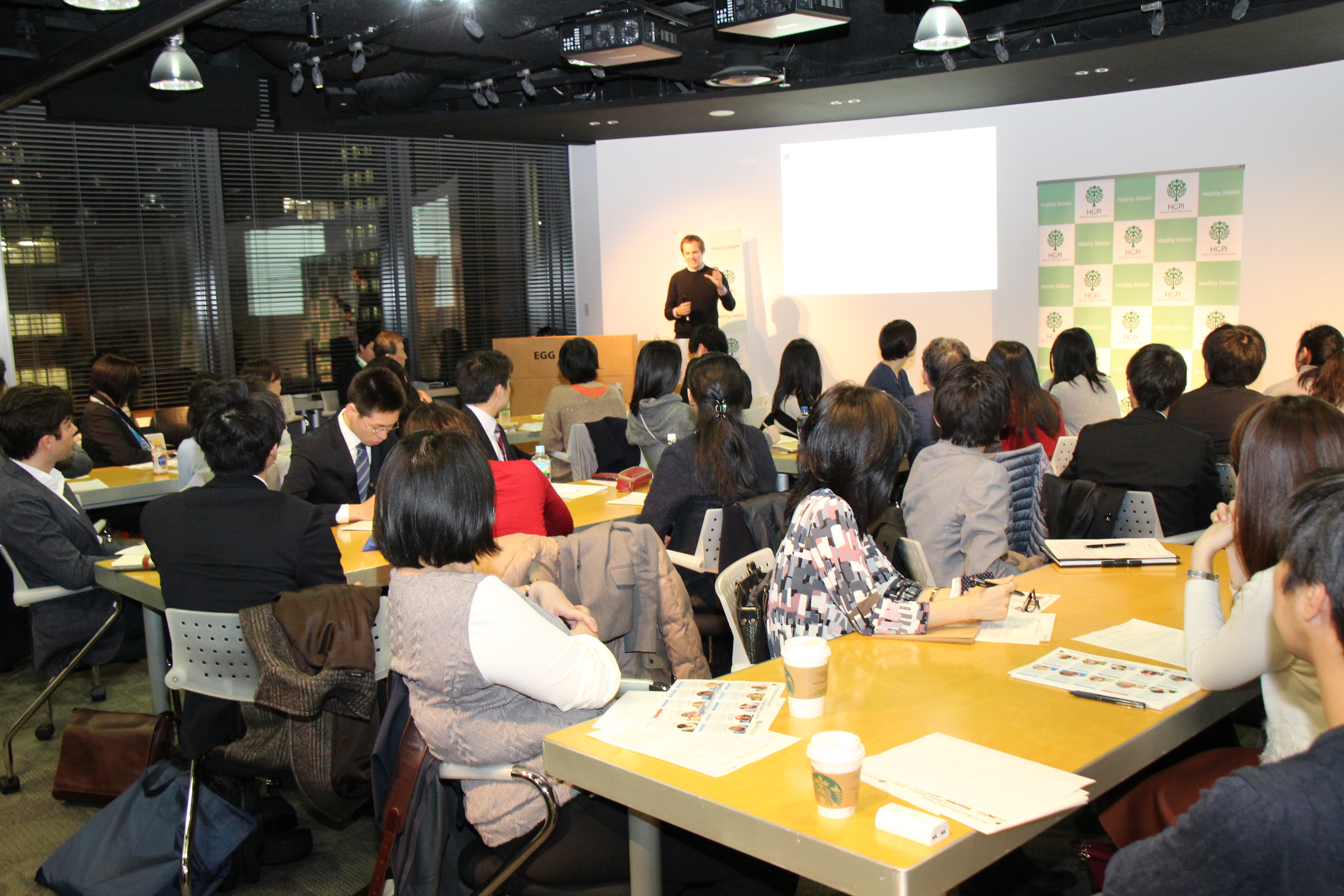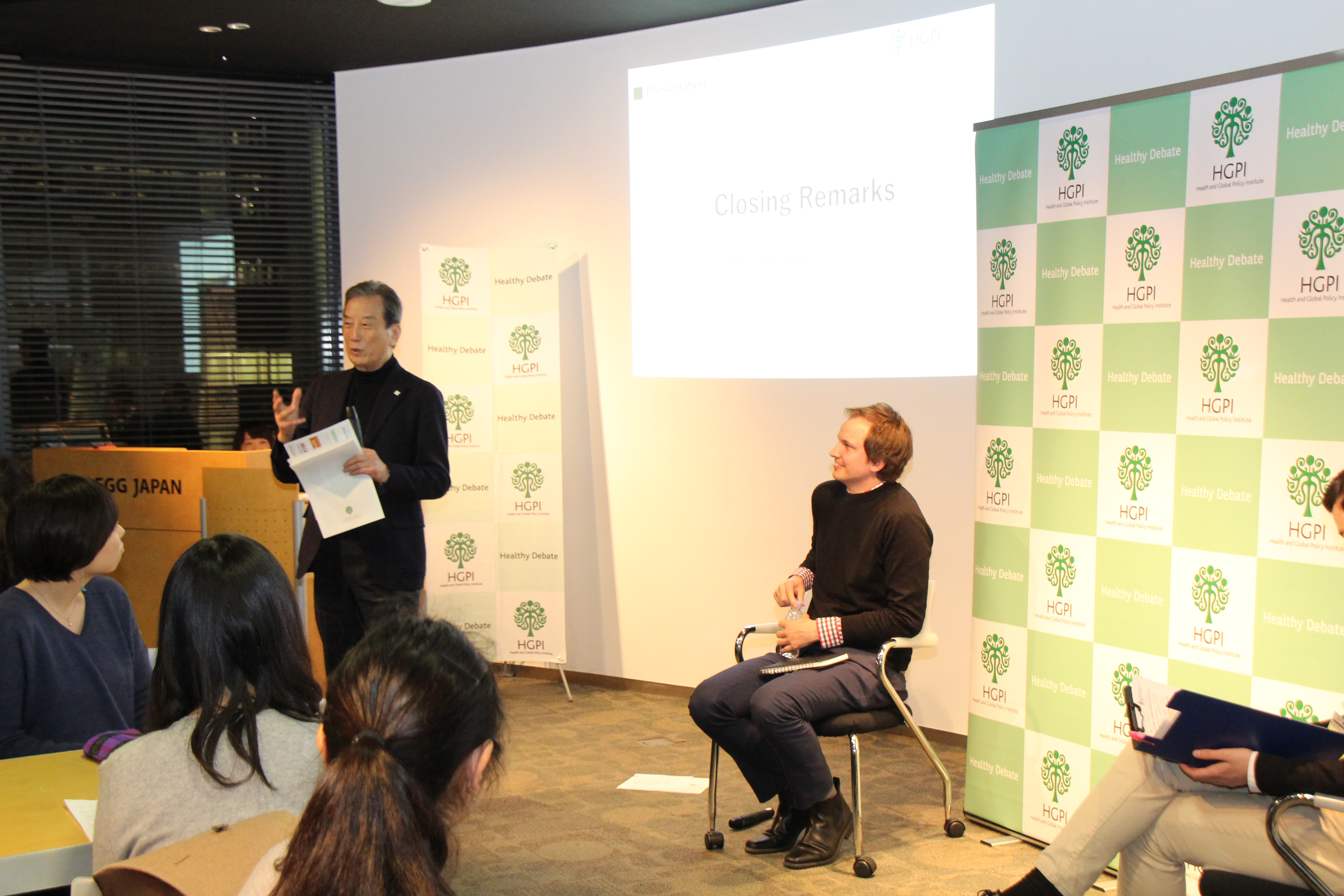[Event report] Evening seminar – Careers in Global Health – (March 6, 2018)
date : 6/22/2018
Tags: Global Health, HGPI Seminar
![[Event report] Evening seminar – Careers in Global Health – (March 6, 2018)](https://hgpi.org/en/wp-content/uploads/sites/2/IMG_1305-1.jpg)
HGPI hosted Mr. Robert Marten for its March 6 evening seminar. Mr. Marten has been involved in global health with various governments, NGOs, and international organizations, including the World Health Organization (WHO). This evening seminar was an occasion for him to share his experiences working with diverse stakeholders. Mr. Marten also took the opportunity to advise, from a global perspective, the approximately 60 young people present at the seminar, including researchers, regular employees and bachelor and graduate students. Mr. Marten explained important skills required for people working in global health, career paths in the field, and workplace environments.
– Why I decided on a career in global health
I majored in political science and history at McGill University in Montreal, Canada. At that time, I was particularly interested in the subject of historiography, which studies how historical points of view evolve over time, and set my mind on doing a PhD in history. However, after joining a seminar about U.S president Ronald Reagan’s response to the HIV/AIDS epidemic in the 1980s, I became fascinated with HIV/AIDS and eventually global health
– On field experience, and becoming a graduate student with new interests
I went to Vietnam in 2004 to gain field experience. At that time, HIV/AIDS was a crisis, and incidence was especially high in Africa. To address that challenge, U.S. President George W. Bush launched the President’s Emergency Plan for AIDS Relief (PEPFAR). That plan was underpinned by huge investments. Vietnam was a recipient country for that initiative, and it became a gathering place for actors involved in HIV/AIDS control such as international organizations, the United Nations, and numerous private aid institutions. PEPFAR was animportant source of funding for organizations battling HIV/AIDS. However, at the same time, the relationship among various aid agencies deteriorated as they competed for such funds. Domestic and international stakeholders gathered to work on a remedy to this problem, and as a result, they established a program to coordinate aid to HIV/AIDS victims via a network connecting the various organizations involved in HIV/AIDS work.
My two-year stint in Vietnam awakened me to the importance of management and policies to support the work of aid agencies. I consequently obtained a Master of Public Policy from the Hertie School of Governance in Germany. Later, I joined the Rockefeller Foundation where I managed, for close to six yearyears, a 20-million-dollar portfolio supporting the field of global health policy worldwide. My grant portfolio focused on the importance of the “Health System Strengthening” approach which focuses on health systems as a whole, and not merely on individual patients.
At present, I am studying the Japanese government’s engagement in global health, particularly its focus on the need to strengthen health systems. I am currently a Council on Foreign Affairs (CFR) Hitachi Fellow at the Japan Center for International Exchange conducting research on Japan’s global health diplomacy.
– What is global health?
There is no one answer to the question of what theme should be emphasized when talking about “Global Health.” The answer differs depending on individual experiences, individual environments, one’s country of residence, culture, and one’s opinion. For example, some might argue WHO works on health policy and health systems, UNICEF focuses mainly on child health, and UNAIDS is concerned almost solely with action on the HIV/AIDS pandemic. This diversity in approaches is what makes “Global Health” interesting.
Differences are visible even at the national level. For example, Nordic countries such as Norway and Sweden emphasize women and children health and gender-related issues. By contrast, Latin American and Caribbean countries often place stronger emphasis on non-communicable diseases (NCDs). In Japan, the current priority is strengthening the health system. Japan is a global champion for Universal Health Coverage (UHC).* By contrast, Japan is falling behind in its measures against tobacco.
*A situation in which all people enjoy access to necessary, high-quality medical and healthcare services at a reasonable cost.
What should be on the global health agenda is an extremely political issue. For example, a great influx of financial assistance from the U.S. government through PEPFAR for HIV/AIDS, consequently influenced Vietnam’s health system and policies. But, as assistance ended, it fell upon the Vietnamese Government to maintain these policies and investments. As every country faces its own specific set of circumstances, prior consensus-building should be achieved on deciding what issues are most important, and what interventions are necessary.


The talk was followed by a lively Q&A session. Mr. Marten answered questions about his experiences, and advised attendees on the role they could play in the future in the field of public health, including through public-private partnerships (PPPs).
– Should a career in global health start in the field or academia?
Field experience is necessary to get a better grasp of the challenges that exist in global health. Some may think that there are few people willing to host them in the field, but you can find many opportunities by directly inquiring or asking friends for help. I urge everyone to try hard at that.
– Is expertise in a medical discipline necessary for working in global health?
Up until now doctors have been the central actors in global health. However, health challenges have grown more complex, and I believe
that approaches which are based on perspectives inspired from various disciplines are gaining in importance. Increasingly, we see cultural anthropologists, political scientists, and sociologists becoming more involved in global health work.
– What can the private sector contribute to global health?
Contributions by the private sector cannot be ignored or disregarded. Many challenges cannot be addressed without a proper knowledge of medicine, insurance, food products, and the medical equipment industry. However, it is important to keep in mind that PPPs are not one size fits all solutions. There are sometimes mismatches between the objectives of private business and those of the global health field.
– How can awareness be raised about global health challenges?
Produce numerical figures based on scientific evidence. Identify the actors that are necessary to resolve challenges, and convey to them the meaning of those numerical figures. Media briefings, awareness raising about such issues among politicians, and academic papers are also important. It’s not easy to draw attention to a particular issue, but with the right communication strategy, social interest can be increased.
– How can support for global health initiatives be sustained?
Three factors are important in sustaining overseas development aid: 1) Individuals (investments in human resources); 2) Institutions (investments in universities and research centers); and 3) Ideas (efforts to nurture them). These are the main keys for promoting improvement in health systems and policies.
– How can Japanese achievements be disseminated throughout the world?
In Japan, a number of policies have achieved success in tackling diseases associated with smoking and ageing, as well as NCDs. However, Japan has not done so well in broadcasting its achievements abroad, causing them to be misunderstood or overlooked by the international community. Moving forward, more effort should be expended on communicating outcomes.

HGPI Chairman Kiyoshi Kurokawa gave closing remarks. Dr. Kurokawa proposed that if each and everyone in the audience got involved in tackling public health challenges with as much passion as Mr. Marten, the world would change. He urged young people to not feel restricted by conventional ideas but instead do what they feel needs to be done.
About Mr. Robert Marten
Robert is currently a Visiting Fellow and a Council on Foreign Affairs (CFR) Hitachi Fellow at the Japan Center for International Exchange (JCIE) in Tokyo, Japan where he is researching Japan’s engagement in global health. Before this, Robert spent 18 months in Sierra Leone with the World Health Organization coordinating efforts to strengthen the country’s health system post-Ebola.
Before serving in Sierra Leone, he worked at the Rockefeller Foundation in New York where managed a more than $20-million grant portfolio focused on global health policy for close to six years. Robert coordinated research and advocacy efforts to embed health systems and UHC within the post-2015 development agenda. He previously consulted with the World Bank, the World Health Organization, and German Technical Cooperation in Zambia and South Africa. Robert has published articles in the Lancet, Health Policy and Planning and the WHO Bulletin amongst others. He has served on the Board of Directors of the Global Health Council, and is on the editorial board of Global Health Governance and Globalization and Health.
Before this experience, Robert was a research assistant with the Global Public Policy Institute in Berlin from 2007-2008. Robert’s past experience also includes work in Vietnam and Burma with Volunteers-in-Asia, UN Volunteers, SwissContact, USAID, the Vietnam Education Foundation, CARE, the Vietnamese government and the Netherlands Medical Committee.
Robert received a bachelor’s degree from McGill University, a master’s degree in public policy from the Hertie School of Governance, a certificate in global health effectiveness from the Harvard School of Public Health, a master’s degree in public health from Johns Hopkins University, and is currently pursuing a doctoral degree from the London School of Hygiene and Tropical Medicine.
Top Research & Recommendations Posts
- [Policy Recommendations] The Path to a Sustainable Healthcare System: Three Key Objectives for Public Deliberation (January 22, 2026)
- [Research Report] The 2025 Public Opinion Survey on Healthcare in Japan (March 17, 2025)
- [Research Report] Perceptions, Knowledge, Actions and Perspectives of Healthcare Organizations in Japan in Relation to Climate Change and Health: A Cross-Sectional Study (November 13, 2025)
- [Policy Recommendations] Reshaping Japan’s Immunization Policy for Life Course Coverage and Vaccine Equity: Challenges and Prospects for an Era of Prevention and Health Promotion (April 25, 2025)
- [Research Report] AMR Policy Update #4: Cancer Care and AMR (Part 1)
- [Research Report] The 2023 Public Opinion Survey on Satisfaction in Healthcare in Japan and Healthcare Applications of Generative AI (January 11, 2024)
- [Public Comment Submission] “Assessment Report on Climate Change Impacts in Japan (Draft Overview)” (December 24, 2025)
- [Research Report] The 2026 Public Opinion Survey on Healthcare in Japan (February 13, 2026)
- [Policy Recommendations] Developing a National Health and Climate Strategy for Japan (June 26, 2024)
- [Research Report] The Public Opinion Survey on Child-Rearing in Modern Japan (Final Report) (March 4, 2022)
Featured Posts
-
2026-01-09
[Registration Open] (Hybrid Format) Dementia Project FY2025 Initiative Concluding Symposium “The Future of Dementia Policy Surrounding Families and Others Who Care for People with Dementia” (March 9, 2026)
![[Registration Open] (Hybrid Format) Dementia Project FY2025 Initiative Concluding Symposium “The Future of Dementia Policy Surrounding Families and Others Who Care for People with Dementia” (March 9, 2026)](https://hgpi.org/en/wp-content/uploads/sites/2/dementia-20260309-top.png)
-
2026-02-05
[Registration Open] (Webinar) The 141st HGPI Seminar “Current Status and Future Prospects of Korea’s Obesity Policy: Voices of People with Lived Experience in Policy Promotion” (March 3, 2026)
![[Registration Open] (Webinar) The 141st HGPI Seminar “Current Status and Future Prospects of Korea’s Obesity Policy: Voices of People with Lived Experience in Policy Promotion” (March 3, 2026)](https://hgpi.org/en/wp-content/uploads/sites/2/hs141-top-1.png)




